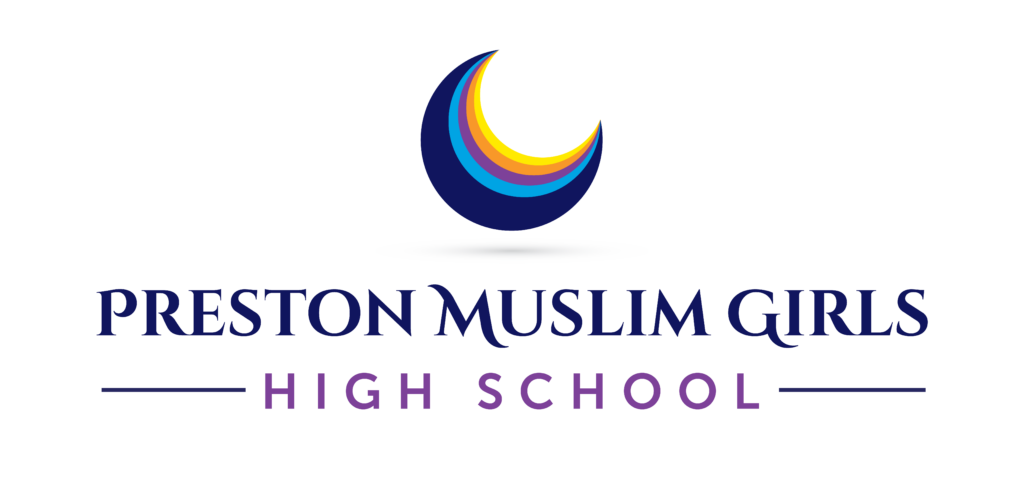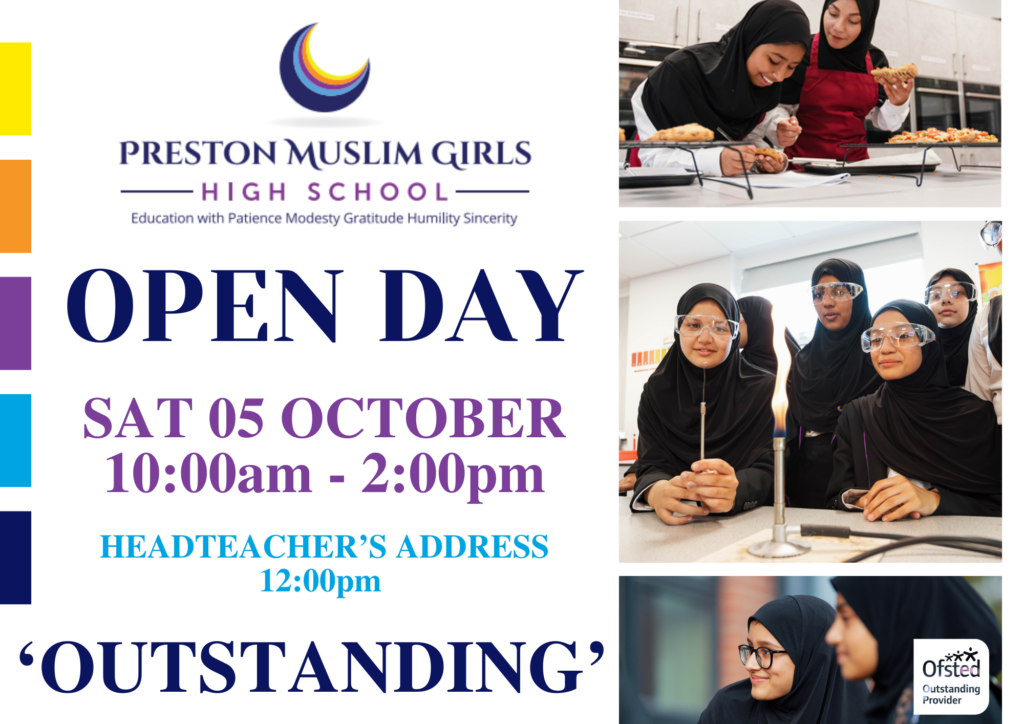Intent
Personal, Social, Health and Economic (PSHE) education is a school subject which helps students develop the knowledge, skills and attributes to stay healthy and safe in the present and prepare for their futures. At Preston Muslim Girls High school, we believe that good PRSHE education also helps pupils to achieve their academic potential. Our intent is to provide an academic PRSHE curriculum that provides opportunities for students to reflect on and clarify their own values and attitudes and explore complex and sometimes conflicting range of values and attitudes they encounter now and in the future.
Our PSHE curriculum focusses on three core themes:
- Health and wellbeing
- Relationships
- Living in the wider world
Our PRSHE curriculum aims to enable students to become healthy, safe, independent, responsible members of society who demonstrate respect and tolerance and are prepared to face and manage the challenges and opportunities of an ever-changing modern Britain. Preventative PRSHE education helps students to know how they can support each other, manage their own behaviour and get help for themselves or their friends when they need it, therefore supporting positive behaviour and attitudes.
The PRSHE programme at PMGHS aims to make a major contribution to preparing young people for the opportunities, responsibilities and experiences of life.
It aims to help students develop in the following key areas:
- Help students to aspire to be the best they can be, to have dreams for their future and know what is required to reach them.
- Provide opportunities for our students to learn about rights and responsibilities and appreciate what it means to be a valuable member of an ever-changing diverse society. We will help them to understand and consider many of the moral, social and cultural issues that are part of growing up in Modern Britain.
- Deepen our students’ understanding of the fundamental British values of democracy, individual liberty, the rule of law and mutual respect and tolerance.
- Develop their sense of self-worth by playing a positive role in contributing to school life and the wider community.
- Stimulate, challenge and nurture student’s spiritual, moral, social and cultural curiosity.
- Help students to understand the importance of their physical and mental health, understand emotions and feelings and have strategies to help them become resilient and confident.
- Help students to have a good understanding of themselves, to have empathy, an ability to work with others and to form and maintain positive relationships treating everyone equally with tolerance and respect.
- Teach our students age-appropriate understanding of healthy relationships through appropriate relationship and sex education.
- Teach our students about personal safety (online and off-line) and we will ensure students know where and how to get help if needed.
Our RSE teaching is in accordance with Islamic principles and values. It emphasises the central importance of marriage and the family whilst acknowledging that all pupils have a fundamental right to have their life respected whatever background they come from.
Our Mission Statement commits us to the education of the whole child (spiritual, physical, intellectual, moral, social, cultural, emotional) and we believe that RSE is an integral part of this education. Furthermore, our school aims state that we will endeavour to raise pupils’ self-esteem, help them to grow in knowledge and understanding, recognise the value of all persons and develop caring and sensitive attitudes.
All RSE topics are taught by female staff to promote a healthy, positive atmosphere in which RSE can take place and to ensure that pupils can ask questions freely, be confident that their questions will be answered and be sure that they will be free from bullying or harassment from other children and young people. The use of ground rules, negotiated between teachers and pupils also helps to create a supportive climate for this discussion.
The PRSHE curriculum at PMGHS is based on DfE Draft Statuary Relationships and Sex Education (RSE) and Health Education. The programme of learning follows the PSHE Association and has strong links with the Association of Muslim Schools (AMS) to embed the faith perspective of RSE topics.
Implementation
The three core themes -Health and Wellbeing, Relationships and Living in the Wider World- are covered in our KS3 and KS4 curriculum. The intention is that the pupils will learn about being confident in addressing the challenges of effective learning and making a full and active contribution to society but will have opportunities to revisit their learning in order to build on and deepen prior knowledge and understanding.
PRSHE lessons are taught by trained staff who are the pupils’ Form Tutors. This ensures that students are comfortable to discuss possibly sensitive issues, with a trusted and approachable member of staff. Where there is a specific need, such as students with an EHCP, SEND/EAL, support staff are assigned to the tutor group to support with the delivery of PRSHE curriculum throughout the year, to ensure students learning and understanding is secure.
Teachers make excellent use of mini plenaries, whiteboards, and extended mind maps in the booklets, to check understanding at the beginning, during and at the end of the lessons. This then helps decide whether to progress a theme or revisit certain aspects. Questioning is a key tool used throughout the department and pupils feel safe and valued when answering and discussing in class.
The quality of teaching and learning in PSHE creates a positive environment which is safe and interest and excites pupils to be inquisitive, ask questions and listen to others.
Teachers are routinely supported through relevant in-school training and are provided with suitable and relevant resources. The curriculum is engaging and varied using case studies and research that is relevant to our pupils and our school setting. We have amended the schemes of work at both KS3 and KS4 to include the new Relationships Education, Relationships and Sex Education (RSE) and Health Education’ to follow statutory guidelines. This ensures that the pupils are very well-equipped for the next stage of their education or employment.
Subject-specific vocabulary is demonstrated in every PRSHE lesson and teachers regularly use and encourage pupils to use both tier 2 and tier 3 vocabulary. Etymology of key words are taught to improve pupils’ understanding and lists of key words for topics at KS3 and KS4 are recorded in pupils’ workbook.
PRSHE lessons are regularly monitored through:
- Learning walks
- Checking pupils’ workbooks
- Student voice- Survey and Student Council
- Teacher Voice- Survey
Impact
The curriculum is deliberately planned to enable pupils to revisit core themes and deepen understanding. Retrieval of relevant prior learning at the start of core theme aims to embed these concepts. To help recall this information, ‘low stakes testing’ is used in the form of diagnostic tests, which does not just help measure understanding, it also develops understanding.
Pupils are actively engaged in lessons and their understanding of the curriculum is enhanced through proximal learning. They are given the opportunity to develop positive character traits that will support them to be successful. Pupils are informed about making positive, safe and healthy choices in their personal lives, including online. Pupil feedback on the PRSHE Curriculum is positive and shows it is relevant and helpful to them. Pupils develop a secure understanding of the protected characteristics and how equality and diversity are promoted. Parents are updated about the PRSHE Curriculum, what and how it is taught so they can support further at home.
The importance of personal and character development is widely understood by all students, who engage with the opportunities available to them; and by all tutors who promote and support a wide range of character and personal development opportunities for all students. Pupils are effectively guided and supported in careers information, education, advice and guidance, and how it benefits them in choosing next steps.
All students experience a wide range of learning opportunities within and beyond the curriculum that builds character and strengthens the school culture of ambition and excellence for all. Pupils are exposed to new learning, including debate and discussion; and have opportunities to learn socially as well as academically. Pupils at PMGHS make positive contributions to the school and wider community, building confidence and character to be responsible and successful citizens.

